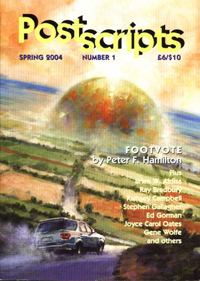A postscript is most often a sentence or paragraph added after the signature of a letter.
Contents
Postscript or PostScript may also refer to:
A postscript is most often a sentence or paragraph added after the signature of a letter.
Postscript or PostScript may also refer to:
Mercury most commonly refers to:
P.S. commonly refers to:
Queen most commonly refers to:
Script may refer to:
Backbone may refer to:
More may refer to:
Post, POST, or posting may refer to:
Source may refer to:
Identity may refer to:
Unknown or The Unknown may refer to:
Babel is a name used in the Hebrew Bible for the city of Babylon and may refer to:
Departure, Departures or The Departure may refer to:
5 is a number, numeral, and glyph.
A fact is an occurrence in the real world.
Pop or POP may refer to:

Postscripts was a quarterly British magazine of science fiction, fantasy, horror, and crime fiction, first published in June 2004. It was published by PS Publishing and the editor-in-chief was Peter Crowther.
A remix is an alternative version of a recorded work.
Make-up or makeup may refer to:
Lifestyle often refers to:
Anna may refer to: